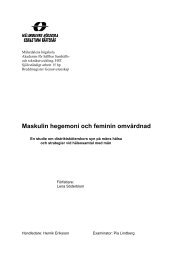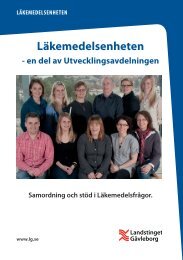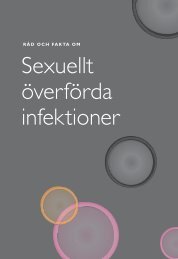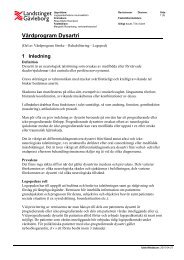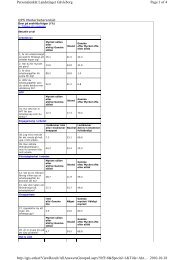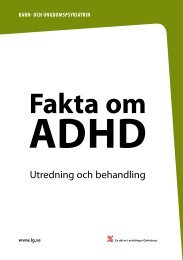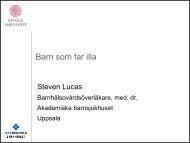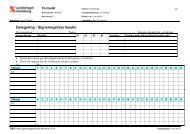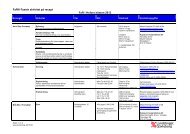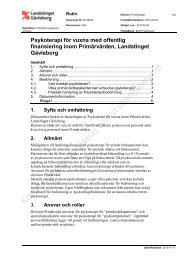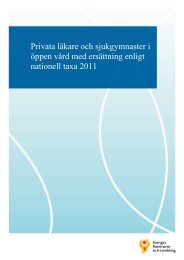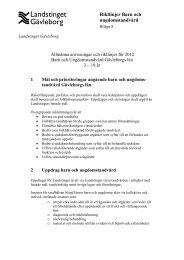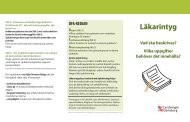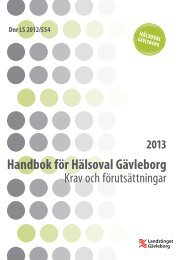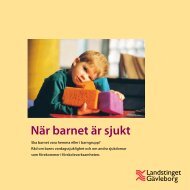à rlig rapport om forskningen i Landstinget Gävleborg 2010
à rlig rapport om forskningen i Landstinget Gävleborg 2010
à rlig rapport om forskningen i Landstinget Gävleborg 2010
- No tags were found...
Create successful ePaper yourself
Turn your PDF publications into a flip-book with our unique Google optimized e-Paper software.
DIVISION MEDICINDoktorsexamenFörfattare:Titel:Magnus LindbergExcessive Fluid Overload Among Haemodialysis Patients: Prevalence, IndividualCharacteristics and Self‐regulation of Fluid IntakeInstitution: Uppsala universitet, Medicinska och farmaceutiska vetenskaps<strong>om</strong>rådet,Medicinska och farmaceutiska vetenskaps<strong>om</strong>rådet, centrumbildningar mm,Centrum för klinisk forskning, GävleborgNyckelord:Behavioural medicine, fluid overload, adherence, haemodialysis, self‐efficacy,attentional style, depressive sympt<strong>om</strong>atology, cluster analysis, tailoredtreatment, quasi‐experimental single‐case design, Fluid Intake AppraisalInventory (FIAI), renal nursingDisputation: <strong>2010</strong>‐05‐19, Sal IV, Universitetshuset, Övre Slottsgatan 2, Uppsala, 13:00(Svenska)Opponent:Abstrakt:Wredling, Regina, Professor emirita (Karolinska Intitutet, Inst f neurobiologi,vårdvetenskap och samhälle)This thesis is c<strong>om</strong>prised of four studies and concerns haemodialysis patients’confidence in being able to manage fluid intake between treatment sessions,and whether the fluid intake is influenced by certain modifiable characteristicsof the persons in question. The overall aim was to study aspects of excessivefluid overload and haemodialysis patients’ self‐regulation of fluid allotment fr<strong>om</strong>a bio‐psychosocial and behavioural medicine perspective.The extent of non‐adherence to fluid allotment was described in Study I.National registry data were used. Three out of ten Swedish haemodialysispatients had excessive fluid overload and one out of five was at risk fortreatment related c<strong>om</strong>plications due to too rapid ultrafiltration rate.The objective in Study II was to develop and psych<strong>om</strong>etrically evaluate a selfadministeredscale to measure situation‐specific self‐efficacy to low fluid intake.The measure (the Fluid Intake Appraisal Inventory) was found to be reliable andvalid in haemodialysis settings.Subgroups based on individual profiles of self‐efficacy, attentional style anddepressive sympt<strong>om</strong>s were explored in Study III using a cluster analyticapproach. Three distinct subgroups were found and the subgroup structure wasvalidated for clinical relevance. The individuals’ profile concerning self‐efficacy,attentional style and depressive sympt<strong>om</strong>s has to be taken into account innursing interventions designed to reduce haemodialysis patients’ fluid intake.18



